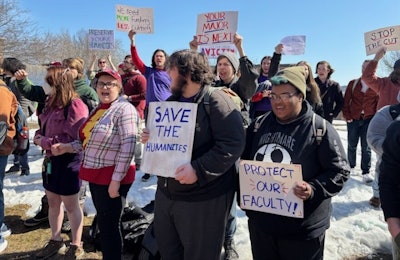
Three major scholarly organizations have taken legal action against the National Endowment for the Humanities (NEH) following what they describe as devastating cuts to the agency's programs, staff, and funding capabilities.
The American Council of Learned Societies (ACLS), the American Historical Association (AHA), and the Modern Language Association (MLA) filed a lawsuit in federal district court seeking to reverse recent actions that have effectively dismantled much of the NEH's operations.
According to the filing, the NEH has suspended entire divisions, initiated firing 65 percent of its staff, and halted numerous grant programs in recent weeks. These actions have occurred despite Congress having already allocated funding to the agency through its normal appropriations process.
The lawsuit alleges multiple legal violations, including failure to provide reasoning for the agency's actions, disregard for constitutional separation of powers, and violation of the Impoundment Control Act of 1974 by refusing to distribute congressionally appropriated funds. The plaintiffs are represented by the Jacobson Lawyers Group, with additional support from the Phi Beta Kappa Society.
The NEH, created in 1965 as a federal agency dedicated to funding humanities programs free of political interference, has awarded over $6 billion in funding throughout its history. Though its current budget represents just one hundredths of one percent of the federal budget, the organizations argue that the agency has an outsized public impact through supporting education, research, and cultural programs nationwide.
The plaintiffs report that more than a thousand previously awarded grants have already been terminated, and the deep staff cuts have severely compromised the NEH's ability to make future grants. These developments threaten educational programs, historical preservation projects, and community partnerships across the country.
"Since it was established, with strong bipartisan congressional support, the NEH has exemplified the value and need for the humanities in a vibrant democracy," said ACLS President Dr. Joy Connolly. "Its thoughtful grantmaking and partnerships are vital to education, libraries, cultural institutions, and community initiatives that study local history and more."
Dr. James Grossman, executive director of the AHA, expressed concern about the implications for American public culture.
"The NEH leverages its very small budget to support work in nearly every venue where Americans engage with the humanities," he said. "We cannot deny our nation's divisions. We cannot heal divisions unless we understand their origins and evolution. It makes no sense to eviscerate the agency that helps all Americans to understand and transcend boundaries of human thought and interaction."
MLA executive director Dr. Paula M. Krebs emphasized the essential nature of humanities education.
"The humanities are not a luxury," she said. "They are a necessity, teaching people vital skills, including how to effectively communicate, construct arguments, evaluate evidence, and build connections across cultures."
The lawsuit comes at a critical time for humanities funding in the United States. Should the cuts remain in place, thousands of educational and cultural programs nationwide could face immediate closure, limiting public access to humanities programming and research that illuminates the nation's history and culture.


















